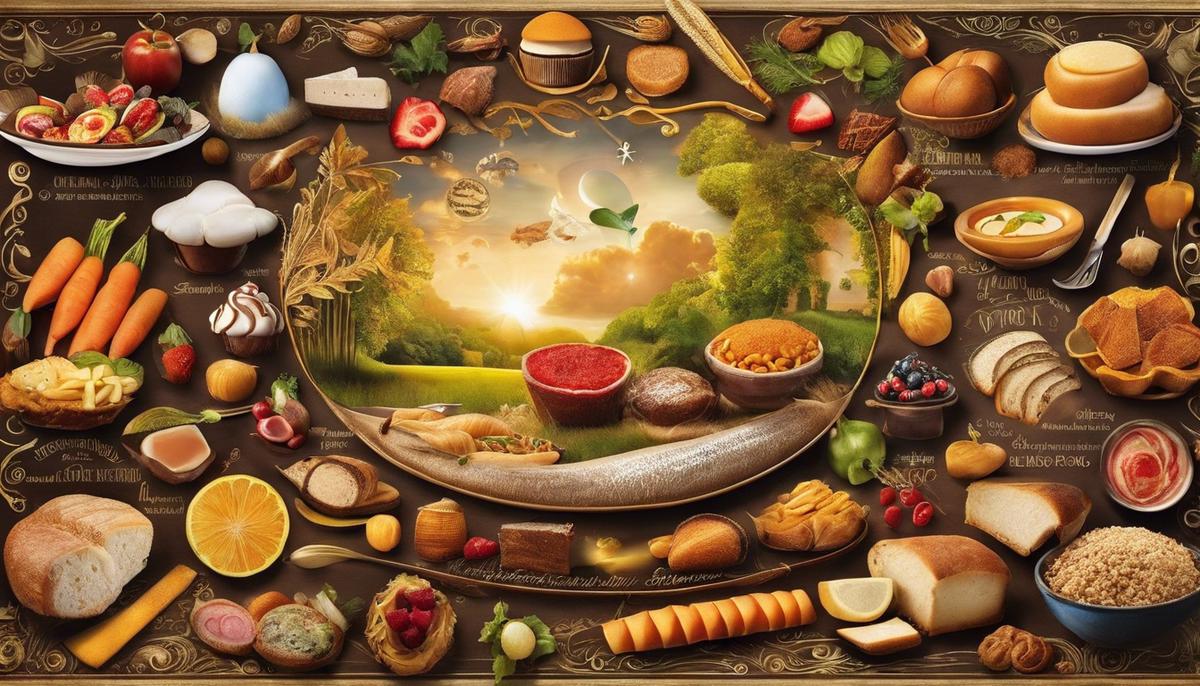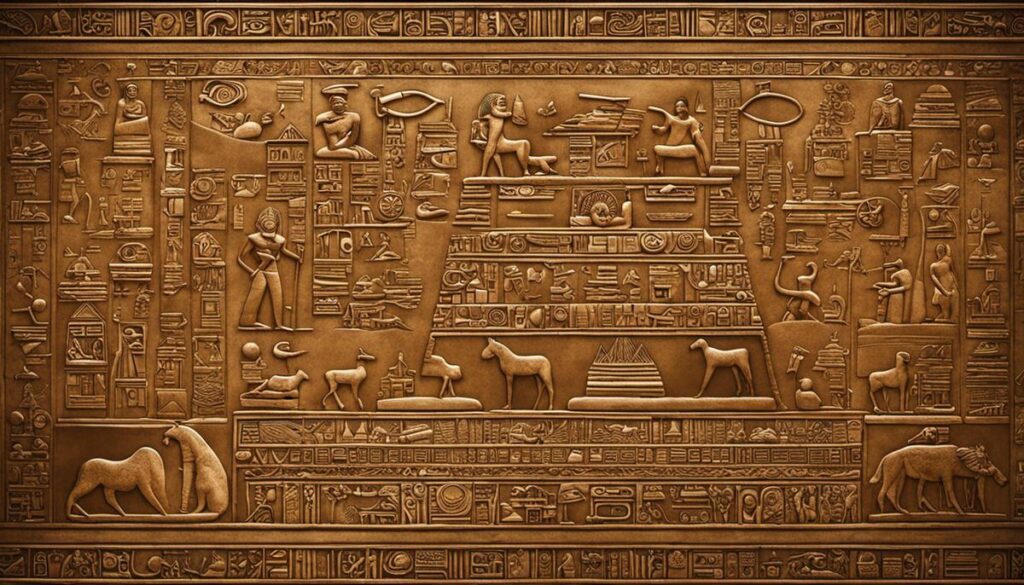Embarking on the fascinating journey of uncovering the subconscious mind’s secrets, our exploration delves into the mysterious world of dreams, specifically, the symbolism of food. Within the intangible realm of dreams, the ordinary becomes extraordinary, injecting profound meaning into something as simple as a plate of food. Rooted deeply in the works of celebrated psychologists like Carl Jung and Sigmund Freud, this essay aims to analyze the expansive spectrum of interpretations that a plate of food holds in dreams, from a psychoanalytic lens to cultural standpoint. Along the trip, we’ll consider the role of personal and societal perspectives in influencing the symbolism of food, reflecting on its traditional meanings, and finally, moving towards the application of such introspections in day-to-day life.
Dream Analysis and the Symbolism of Food
Interpreting Food Symbolism in Dream Analysis: A Psychodynamic Perspective
Dream analysis, or dream interpretation, has been a practice of psychological interest that dates back to ancient cultures. It forms a central pillar of psychoanalytic theory, tracing its roots back to Sigmund Freud’s revolutionary work “The Interpretation of Dreams.” A particularly intriguing aspect of dream interpretation deals with understanding the symbolism of food seen in dreams. This article aims to provide a comprehensive analysis into food symbolism according to the framework of dream analysis.
Food, a basic element for survival, is not only a physical necessity but also holds significant metaphorical connotations in dream interpretation. Though the exact interpretation may vary depending on personal experiences and contexts, universally, food in dreams can symbolize notions of nourishment – both physical and emotional.
Interpretation of specific food types often ties back to universally understood associations. For instance, dreaming of fruits, a universal symbol of fertility and abundance, might suggest a fervent desire for personal growth or fruitfulness in different aspects of the dreamer’s life. Similarly, vegetables, fundamental components of a healthy diet, could symbolize a need for emotional nourishment or personal improvement.
Sweet treats such as cakes or candies might indicate a yearning for pleasure and reward, while the contrary could apply to bitter or sour foods. The consumption of meat, particularly if raw, may represent powerful emotions or primal urges. Bread, a staple across cultures, can denote the basics of life, and dreaming of it might signal essential emotional needs or desires.
While specific food items have general associative meanings, the dream’s context also plays a critical role in shaping the interpretation. Simply seeing food is different from cooking or eating it. Cooking food in a dream might be linked to creativity, transformation, or preparation for future events, while eating could indicate a sense of satisfaction or a craving for emotional or spiritual fulfillment.
The person with whom the dreamer is eating also contributes to the interpretation. Sharing food could represent communion or sharing aspects of oneself with others, whereas eating alone might indicate loneliness or introspection.
Herein, lies a significant caveat; dream analysis is a highly subjective and individualized process. Specific cultural connotations, personal experiences, and feelings about food can significantly impact the dream interpretation. For instance, a vegetarian dreaming about consuming meat will not hold the same interpretation as a carnivore with a similar dream.
The exploration of food symbolism in dream analysis underscores the vast tapestry of human consciousness and the multilayered symbolism within our dreams. Yet, it’s valuable to remember that no interpretation is absolute, given the highly personalized nature of dream content. Intricate and fascinating, dream analysis offers profound insights into understanding the human psyche, and is a testimony to the psychological enrichment achievable through its pursuit. The exploration of food, as dynamic and nuanced as it is in waking life, continues to add a delicious depth to our understanding of dreams.

Food as a Dream Symbol: Cultural and Personal Meanings
Given the subjectivity inherent in dream interpretation, it is crucial to understand how personal experiences, beliefs, and preferences can shape the meaning attached to food symbols in dreams. Dreams, as illuminated by Sigmund Freud, are the mind’s azure canvas, expressing hidden desires, fears and aspirations. A piece of bread may represent sustenance for one individual, while symbolizing labor or struggle for another. Therefore, an individual’s personal encounters with food, whether positive, negative, or neutral, directly influence how they interpret such symbols in their dreams.
The cultural context of an individual also plays an integral role in this dynamic. Across diverse cultures, food carries unique symbolic connotations steeped in long-standing traditions, beliefs, and customs. For instance, in Chinese culture, the symbolism portrayed by various foods such as fish, rice or dumplings is associated with prosperity, abundance, and harmonious relationships, respectively. Thus, dream symbols for an individual from such a background could potentially carry these associations.
Moreover, religious beliefs can also shape the dreamer’s interpretation of food symbolism in dreams. For example, for practicing Jewish individuals, the bread in their dreams can link to the significance of Challah in their religious rituals, hence carrying more profound connotations.
Even within these specific cultural and religious contexts, the subtleties of an individual’s personal interactions with their culture and religion come into play. For instance, a devout person may interpret food symbols in dreams as spiritual blessings or divine messages, while a person with a more secular or critical viewpoint may give it entirely different interpretations.
Observe also the impact personal dietary choices or food-related experiences in waking life can have on interpreting these symbols. A vegan may associate meat in dreams with violence or ethical conflict, while someone who takes pleasure in gourmet cuisine might view it as a symbol of luxury and indulgence.
It is interesting then to consider dreams as multifaceted expressions of our complex cognitive and emotional landscapes. It reveals how dream symbols like food carry multiple layers of meaning, each woven intricately with threads of personal beliefs, cultural traditions, and individual experiences.
Furthermore, taking both personal and cultural perspectives into consideration while interpreting dream symbols can offer a profound understanding of one’s self. Studies in the field of cognitive neurosciences have suggested that dreams play a significant role in memory consolidation and emotional processing. Hence, a nuanced understanding of one’s dreams could lead to improved emotional and cognitive well-being.
From this viewpoint, the faceted prism of dream interpretation, particularly food symbolism, reveals a deep interconnectivity between our conscious and unconscious states, personal and cultural identities, and cognitive and emotional faculties. Being sensitive to these intricate connections can extend not only an individual’s understanding of their dreams but also an appreciation for the richness of human experience in its full panorama.

Plate of Food in Dreams: An In-depth Analysis
Interpreting food symbols in dreams largely hinges on the acknowledgment of their inherent subjectivity. Keeping the sheer depth and intricacy of dreams and their symbolism in mind, one must understand that the interpretation fluidly shifts with an individual’s personal experiences, beliefs, and preferences. For instance, reinforcing comfort and stability, a plate of food may resonate differently for someone who savors gastronomic delights as opposed to someone who views food solely as a bodily requirement. The variances of this spectrum further highlight the multifaceted expressions that dreams unveil, unfolding dense cognitive and emotional landscapes.
Moreover, the cultural context plays a monumental role in presenting diverse interpretations of food symbols in dreams. The significance of a ‘plate of food’ in dreams can considerably differ across cultures, given that food is closely entwined with cultural practices, traditions, and beliefs. The perception and understanding of food symbolism in a dream are indeed deeply enriched by the cultural fabric stringing an individual’s life and experiences.
Religious beliefs also substantially influence the interpretation of food symbolism in dreams. In some traditions, divine providence may be symbolized by abundant food platters. Conversely, dreams of scanty food portions or deprived plates might resonate as divine discontentment or spiritual testing periods in other religious contexts. Supernatural communication via dreams has long been recognized in religious practices, encapsulating food symbolism intricacies.
In the same vein, personal dietary choices significantly tailor the interpretation process. Vegetarians, vegans, or individuals inclined towards specific dietary practices may perceive food-related dreams differently from their omnivore counterparts. Dreaming of a plate of food, garnished with meat, might harbor distinct meanings for each, thus bearing witness to the personal choices mirroring in one’s unconscious mind.
However, the comprehensive interpretation of food symbols in dreams should not be compartmentalized, and segregated insights need to converge for an inclusive understanding. Dreams serve as rich portals connecting our consciousness and unconsciousness, bridging tangible reality with deeper cognitive and emotional layers. They concurrently weave our personal and cultural identities, rooting us in shared commonalities yet affirming our distinctiveness.
Further, the role of dreams in consolidating memory and emotional processing posits them as vital cognitive and emotional outlets. Dream elements, including food symbolism, thus become significant for human consciousness, mediating our interaction with emotions, memories, and several cognitive facets. A plate of food in a dream, in this comprehensive view, enters as a tool fostering self-discovery, introspection, and an exploration into the intricate layers of human consciousness.
The interconnectedness between consciousness and unconsciousness, personal and cultural identities, and cognitive and emotional faculties has the potential to unravel unique insights in dream interpretation. In concluding, it is essential to approach food symbolism interpretation by considering these interconnected domains, reflecting the entirety of our being, and navigating the labyrinth of human consciousness with an open mind.

Applying Dream Interpretations to Daily Life
Understanding the pragmatics of food dreams requires a deep delve into the structural dynamics of subjective interpretation and personal experiences. The intrapersonal dimensions such as beliefs, preferences, and personal histories play an instrumental role in molding the unique interpretation of food symbolism in dreams. These experiences and beliefs, more often than not, are closely intertwined with the dietary choices of an individual, thus leading to a subjective interpretation of these symbolic visions.
Culture and religion are two pillars that strongly shape an individual’s perspective towards food and its symbolism. The rings of cultural context influence the interpretation of food symbols in dreams. For example, certain foods might hold a symbol of affluence in some cultures, while the same might depict scarcity in others. Similarly, the religious beliefs that an individual espouses often influence their dreams significantly. A specific food item might carry a spiritual or religious connotation, thus altering its representation and interpretation in dream analysis.
Deciphering dreams requires considering them as complex canvas painted with cognitive and emotional hues. They are not merely a random assortment of thoughts, but multifaceted expressions that encompass cognitive processes, emotional landscapes, and rich narratives of personal and cultural identities. In this respect, food dreams, like other types, are no less. They carry within them the subtle impressions of our conscious, unconscious, and subconscious lives.
Science suggests that dreams play a significant role in the consolidation of memory and emotional processing. Here, food dreams might reflect the past experiences, emotions, or memories associated with specific food items. For instance, dreaming about a childhood favorite food might indicate a sense of nostalgia or a longing for the past. Delving into the symbolism of such dreams can equip one with valuable insights into their emotions and memories, giving them a deeper understanding of their mental state.
Finally, interpreting food symbols in dreams completes a circular narrative which begins and ends in the understanding of human consciousness. The process bridging the conscious and unconscious sectors of our psyche, works to shed light on our woven internal landscapes. Hence, the interpretation of food symbols blurs the line between what is perceived (our consciousness) and what is repressed or ignored (our unconscious). The symbiosis of these entities are what shape our perception of reality and self-identity.
Therefore, food symbolism in dreams could act as an effective tool for introspective exploration. By offering insights into one’s mental, emotional, and cultural milieu, it opens doors to a more nuanced understanding of one’s psyche. Ultimately, incorporating knowledge from these dream landscapes into daily life can serve as a guide, facilitating personal growth, understanding, and a sense of self-awareness.

Understanding the language of dreams opens the door to a deeper connection with our subconscious mind, nurturing emotional growth, self-awareness, and a better understanding of our psyche. The journey of interpreting dreams, despite its complexity, is a meaningful exploration into the human mind. As we unravel the symbolism of something as simple yet profound as a plate of food in dreams, we get an opportunity to investigate our feelings, reactions, and situations that we may not be consciously aware of. Yet, while the benefits are substantial, it’s essential to approach dream interpretation with caution, for its context is deeply personal and cannot be generalized. Ultimately, dream symbolism, including that of a plate of food, provides a mirror reflecting our subconscious, granting us the opportunity for introspection and personal growth.







